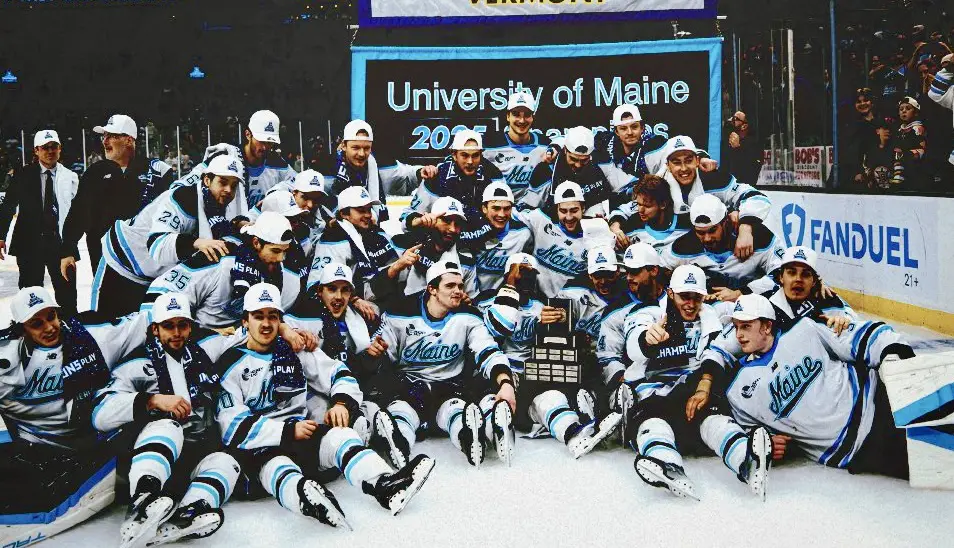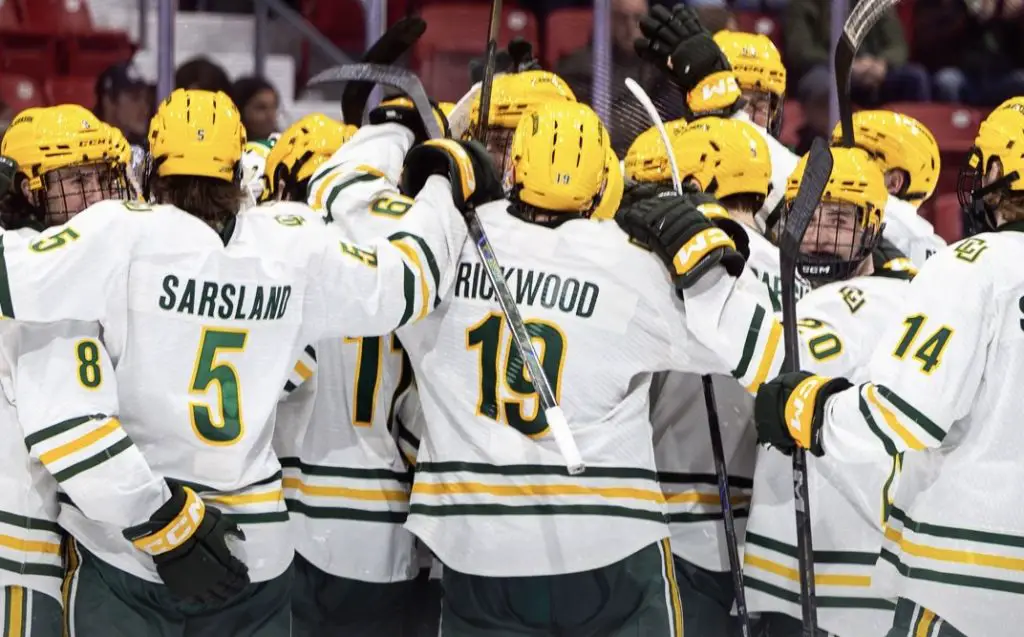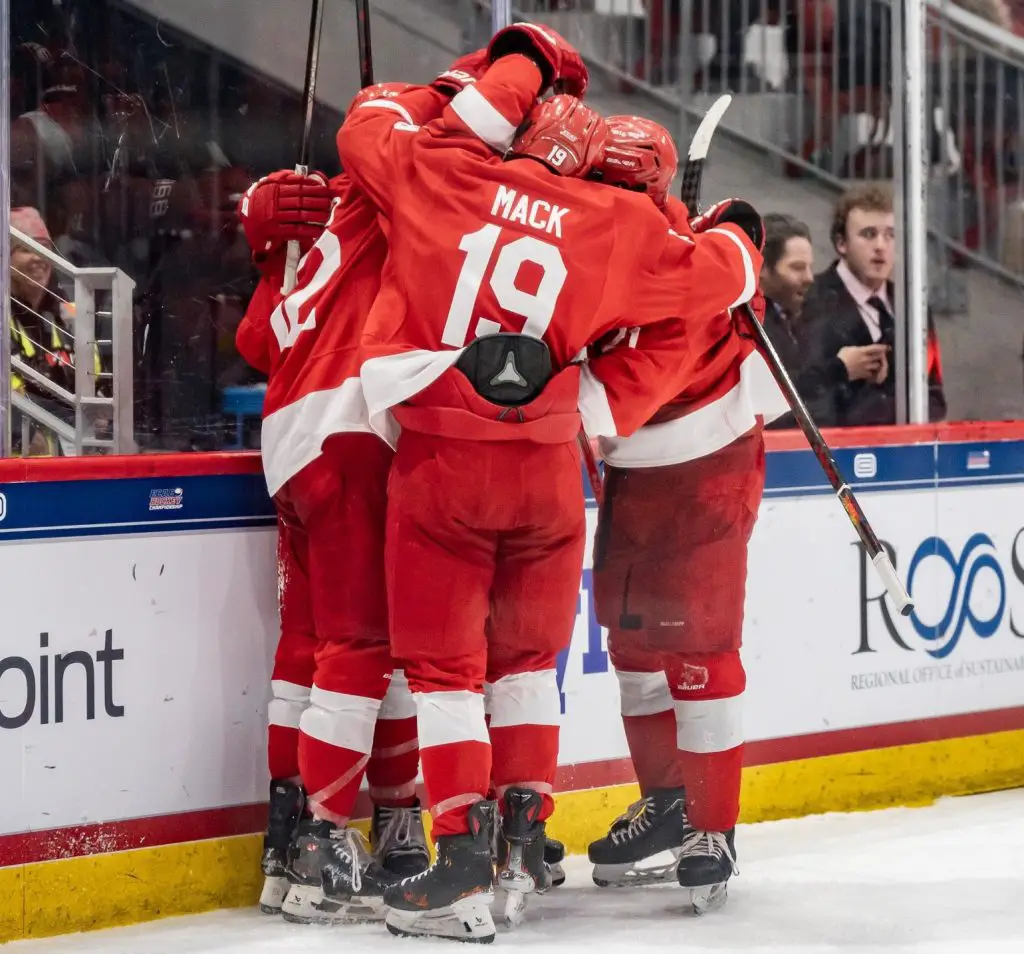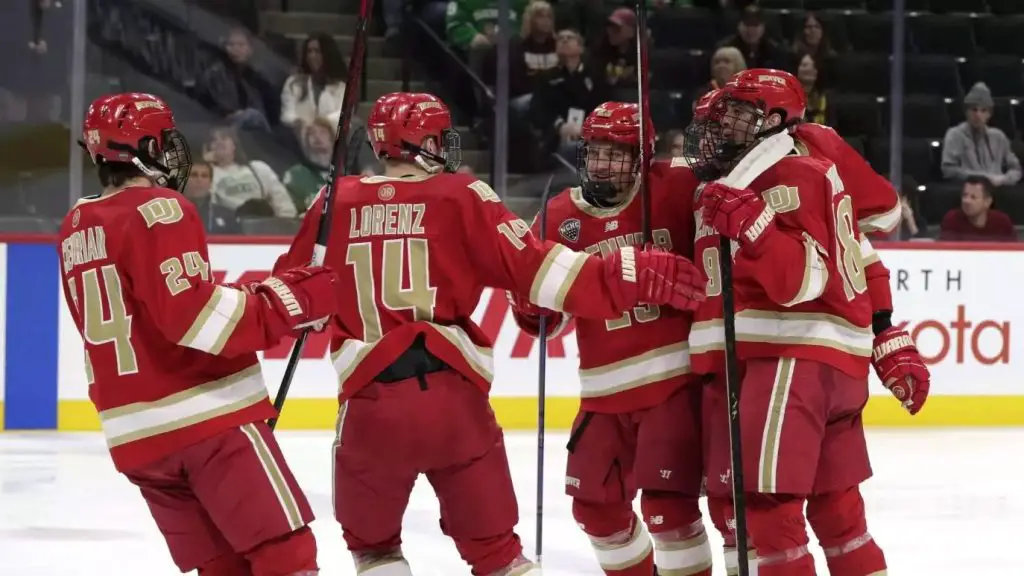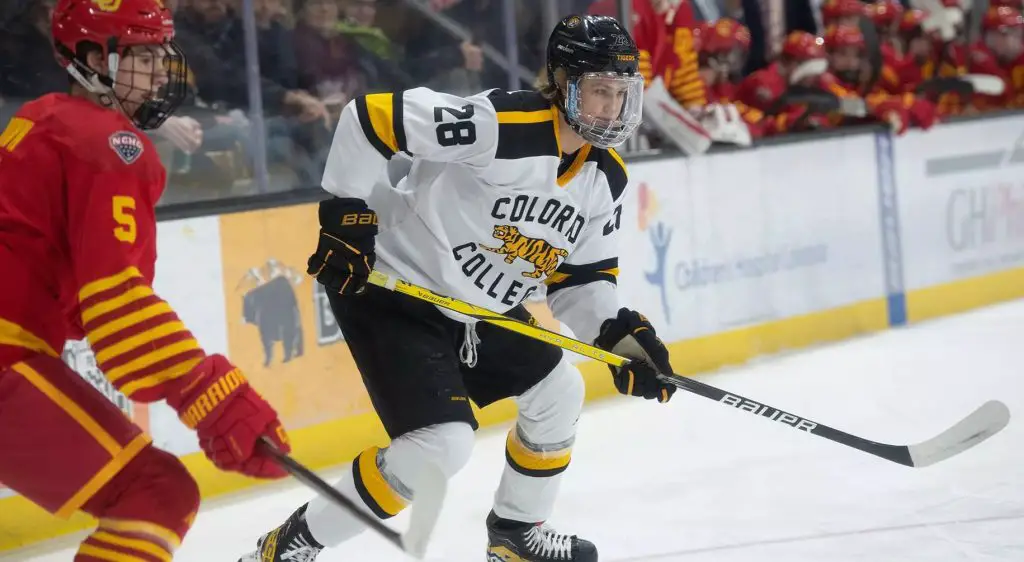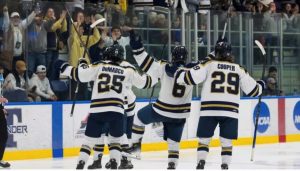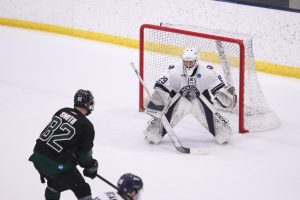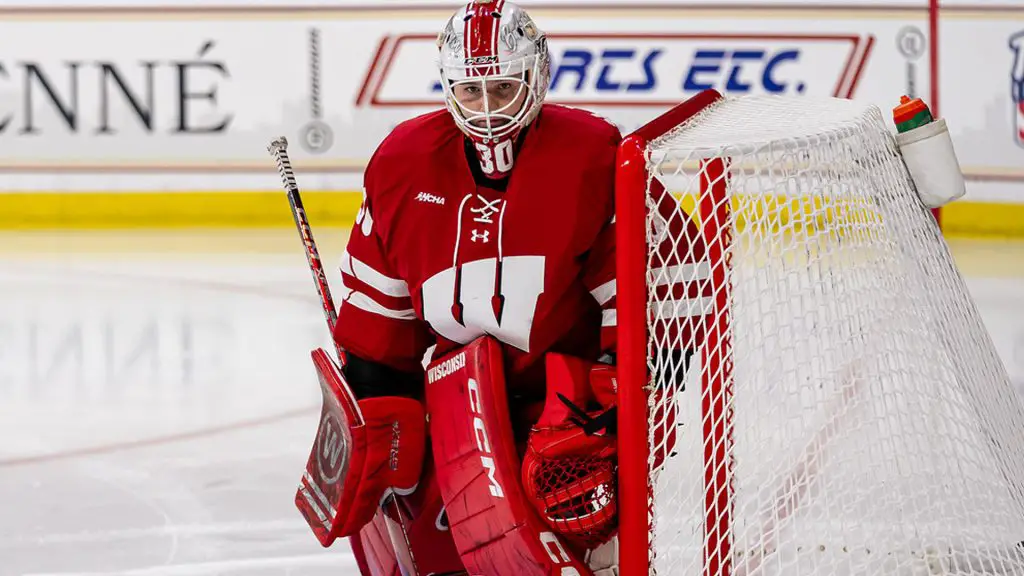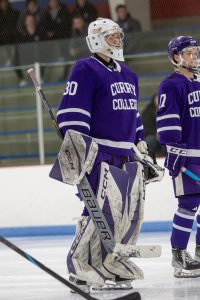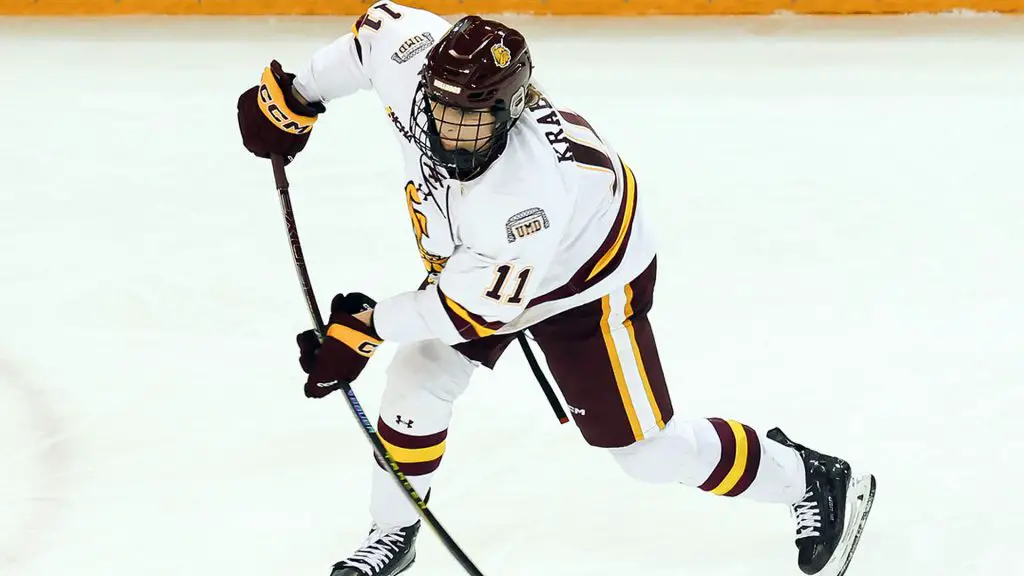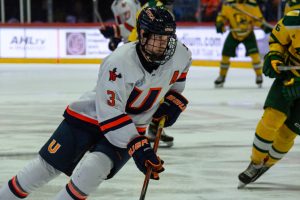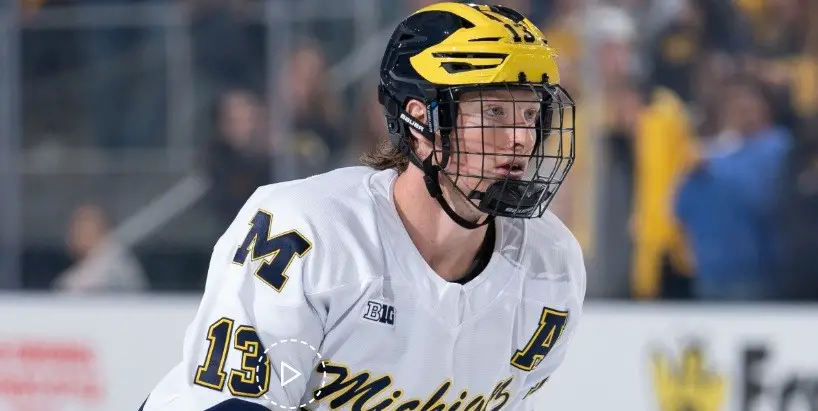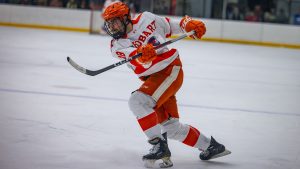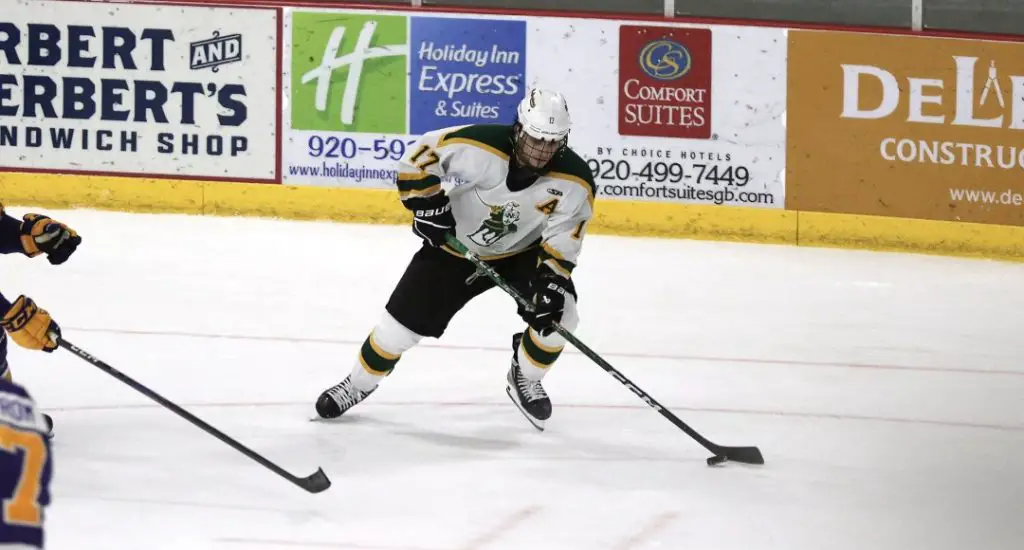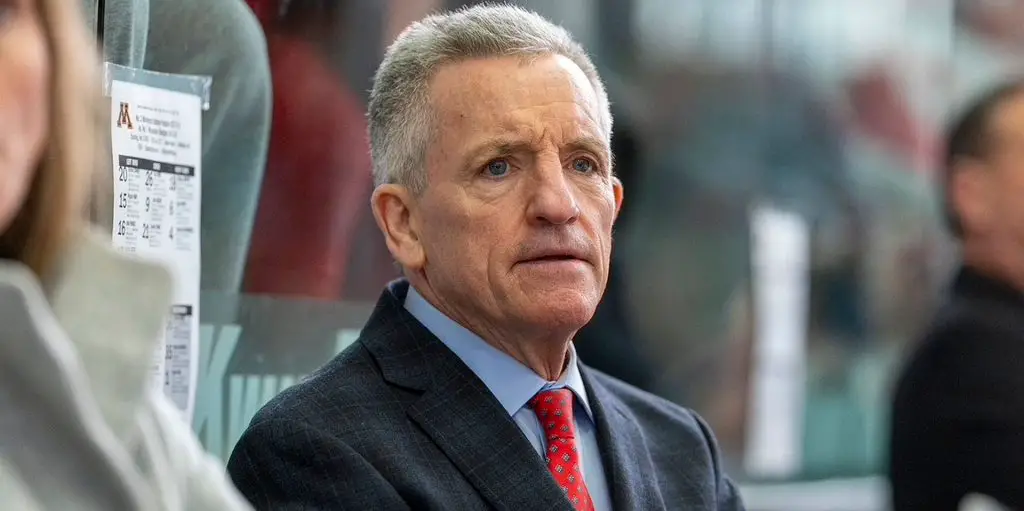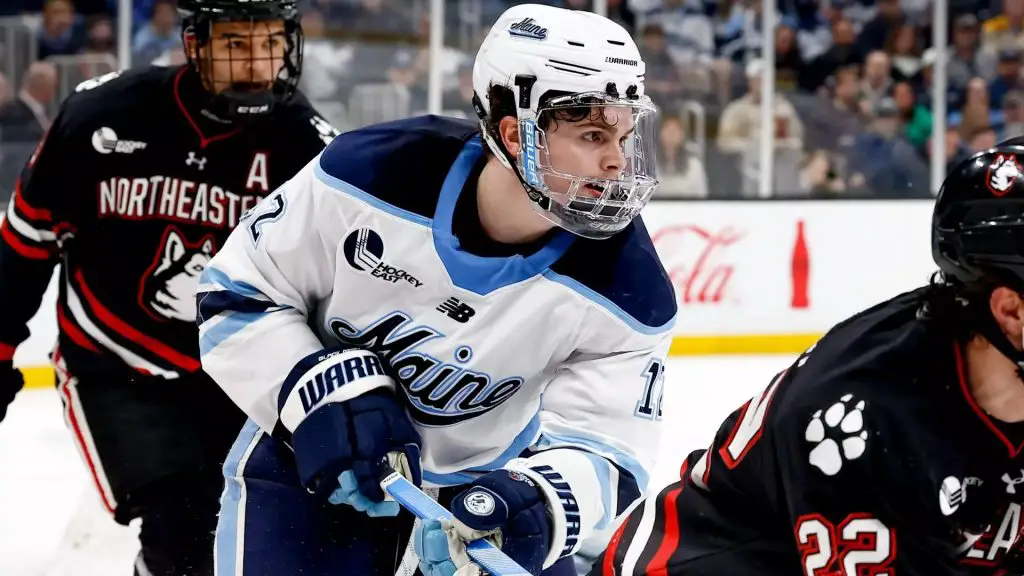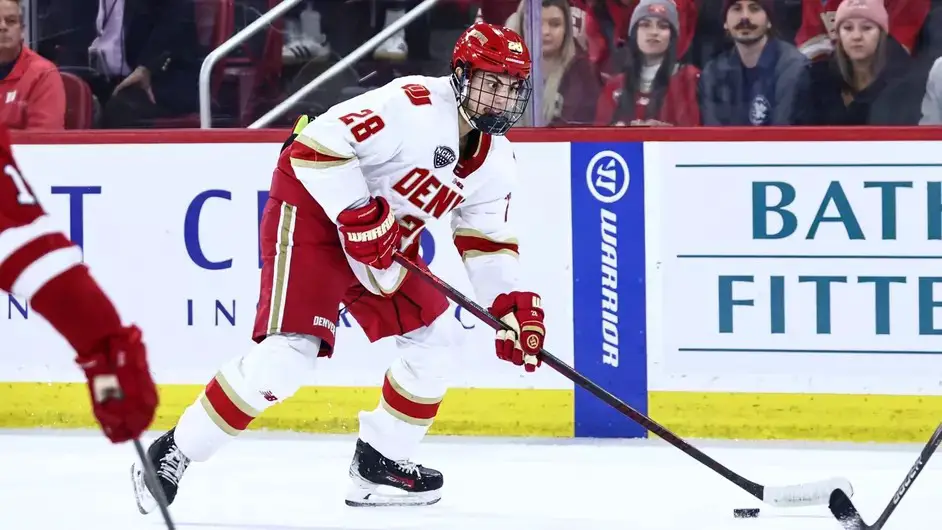
After announcing its individual award finalists last Thursday, the NCHC handed out its 12 year-end individual awards for the 2024-25 season Thursday night at the St. Paul Event Center.
Six different teams took home an individual honor, led by a trio from Western Michigan, including Herb Brooks Coach of the Year Pat Ferschweiler. Denver also claimed three honors, with sophomore defenseman Zeev Buium nabbing both player of the year and offensive defenseman of the Year, while goaltender Matt Davis gloved the senior scholar-athlete award. Arizona State and North Dakota each had a pair of award winners, with UND freshman forward Sacha Boisvert bagging rookie of the year. Minnesota Duluth and Omaha had one winner each.
Buium added NCHC player of the year to his resume after garnering NCHC rookie of the year last season. He also claimed NCHC offensive defenseman of the year for a second straight season, including being unanimous this year. The Hobey Baker Award finalist is tied for the NCAA lead among defensemen with 42 points in 36 games, while his 1.17 points per game are tops among blueliners. His 32 assists also lead defensemen nationally and tie for second in the NCAA among all skaters. He has scored 10 goals this season, which ties for sixth in the country among rearguards.
In conference play, Buium’s eight goals and 20 assists also both led all blueliners, while he became only the third NCHC defenseman ever to record a hat trick, doing so Nov. 15 at North Dakota. He was a unanimous first team all-NCHC selection for the second straight season. The Minnesota Wild first-round draft pick carries a plus-14 plus/minus on the season, while averaging 26:06 time on ice, which is fourth nationally. Buium was a three-time NCHC defenseman of the week this season.
Ferschweiler earned his second NCHC Herb Brooks Coach of the Year honor after first winning it in 2023. This season, he led Western Michigan to its first Penrose Cup, which is also the first regular-season championship in program history. The Broncos finished the regular season with a record of 26-7-1 overall and a mark of 19-4-1 in the conference, before earning their first trip to the Frozen Faceoff since 2022. Ferschweiler’s Broncos are currently ranked number 3 in the country, tying a program best. WMU ranks as the top-scoring team in the NCAA and is tied for sixth on team defense nationally this season.
Another Denver honoree was Davis, who joins Gabe Levin (2016) as the only Pioneers to win the NCHC senior scholar-athlete award. Davis has distinguished himself both academically and athletically during his career at Denver. The two-time national champion is a four-time NCHC all-academic team member and a four-time NCHC distinguished scholar-athlete, as well as a three-time AHCA All-American scholar. The finance major currently carries a 3.96 grade-point average. On the ice, Davis finished the regular season third in the NCHC with a 2.05 goals-against average and fourth with a .922 save percentage in all games played. Last year’s NCAA Frozen Four most outstanding player has started 34 of DU’s 39 games this season, with his 26 wins first nationally. Davis also was a three-time NCHC goaltender of the week this year.
Boisvert shined in his freshman season for the Fighting Hawks, becoming the fourth North Dakota player to win NCHC rookie of the year (Brock Boeser, Shane Pinto, Jackson Blake). The Chicago Blackhawks first-round draft pick leads the Fighting Hawks in scoring with 30 points in all games played. His 16 goals also lead the team and rank third nationally among rookies. In conference games played, Boisvert led all rookies with 11 goals, a mark that tied him for fifth among all NCHC players. He was a unanimous selection to the NCHC all-rookie team, as well as a two-time NCHC rookie of the month and four-time NCHC rookie of the week.
Gloving goaltender of the year was Omaha junior Simon Latkoczy, who became the first Maverick to win the award. The Slovak went 12-8-1 in NCHC play with a conference-best .926 save percentage and a 2.75 goals-against average. He started 31 games this season overall, going 14-16-1. Latkoczy leads the NCHC with 952 saves for an average of nearly 31 saves per game, which also leads the conference. His .922 save percentage is third-best among all NCHC goalies. Latkoczy was a first team all-NCHC honoree this season and a four-time NCHC goaltender of the week.
Western Michigan swept the forward awards with sophomore Alex Bump earning forward of the year and graduate student Tim Washe capturing defensive forward of the year.
Bump followed up his all-rookie team campaign by earning unanimous first team all-NCHC honors. He led the Broncos and ranks third in the NCHC with 43 points this season. The Philadelphia Flyers draft pick has tallied 20 goals overall, tying for third in the NCHC, while his 15 markers in conference play won Bump the NCHC goal-scoring title. He’s added 23 assists this year, while averaging 1.19 points per game. In conference play, Bump tied for third with 29 points in NCHC games and was a two-time forward of the week.
Washe has been a standout for the Broncos in his final season in Kalamazoo, guiding WMU to its first Penrose Cup. The team captain led the NCHC with a faceoff win percentage of 64.5 percent in the regular season, racking up 389 wins in the dot. His 61.4 percent clip in conference play this season was also tops. Washe blocked 24 shots and posted a plus-20 plus/minus rating overall, which is second among NCHC forwards. Washe added a plus-10 mark in conference games. His seven game-winning goals this year tie for third in the NCAA, while he has tallied 32 points (14 goals, 18 assists) in 36 games.
In his first season in the NCHC, senior Ty Murchison picked up NCHC defensive defenseman of the year honors. Murchison was a leader on the Sun Devils blue line this season, helping his team to a runner-up finish in its first NCHC campaign. The ASU alternate captain leads the NCHC with 91 blocked shots, 23 more than anyone else, including 59 in conference play, also first with nearly two and a half blocks per game. As a team, the Sun Devils also tied for third in the NCHC, allowing just 2.75 goals per game. Playing in all 36 games this season, the Philadelphia Flyers draft pick chipped in four assists while posting a plus-7 plus/minus.
Another Sun Devil to leave with hardware Thursday night was ASU graduate student forward Artem Shlaine, who won the NCHC’s three stars award. Shlaine picks up the award after earning 28 ‘three stars’ points this season in NCHC games. He was named the first star of the game four times in conference play. The New Jersey Devils draft pick played a big role in the Sun Devils’ first season in the NCHC. He finished second in conference scoring with 31 points on 14 goals and 17 assists to earn first team all-NCHC honors. The 14 tallies were also second in conference play, while he tied for second in the NCHC with two short-handed goals. Shlaine’s 1.23 points per game are third in the conference in all games played.
Graduate student forward Joe Molenaar became the second straight Bulldog to earn the NCHC sportsmanship award, joining Darian Gotz last year, while he’s the fifth Minnesota Duluth player to claim it in 12 years. Molenaar was connected with the Stien family in the Duluth area after they saw a feature about him discussing the loss of his father to cancer at a young age. At the time, John Stien, the father, was facing a terminal cancer diagnosis. At John’s request, Joe met with him to offer guidance on how to help his kids through the difficult journey the family was facing. Since John’s passing, Joe has remained a source of support for the Stien children, even creating bracelets in their father’s memory to share with teammates and friends.
On the ice, Molenaar has only three minor penalties all season. He was a 2024 Hockey Humanitarian Award nominee and a two-time member of the NCHC academic all-conference team at St. Cloud State, prior to transferring. Now he is working towards his graduate degree in economics at Minnesota Duluth.
Earning the eighth annual NCHC media excellence award is North Dakota radio play-by-play broadcaster Tim Hennessy. Hennessy has served as the voice of North Dakota hockey for 45 years and is one of the two longest-tenured broadcasters in Division I college hockey. He has been on the call for six of UND’s eight national championships, 16 Frozen Fours, 29 NCAA tournament appearances and 10 conference tournament titles. He has worked with five different head coaches and has covered the entire current UND coaching staff as both coaches and players. Hennessy is a two-time North Dakota sportscaster of the year, including this year, and has won multiple regional Emmys for his voiceover work.
For eight of the awards presented Thursday night, winners were determined based on voting by the conference’s nine head coaches and one media member covering each of the NCHC’s nine programs. Athletic directors at each NCHC school had a vote on Herb Brooks Coach of the Year, as well, along with the coaches and media.
The senior scholar-athlete award is voted upon by the conference’s nine faculty athletics representatives (FARs). The sportsmanship award is voted on by conference staff from submitted nominations by member schools, while the media excellence award is voted on by the conference’s sports information directors from submitted nominations. The three stars award goes to the highest point total of ‘stars of the game’ points earned during conference games only (five for first star, three for second star, one for third star).
